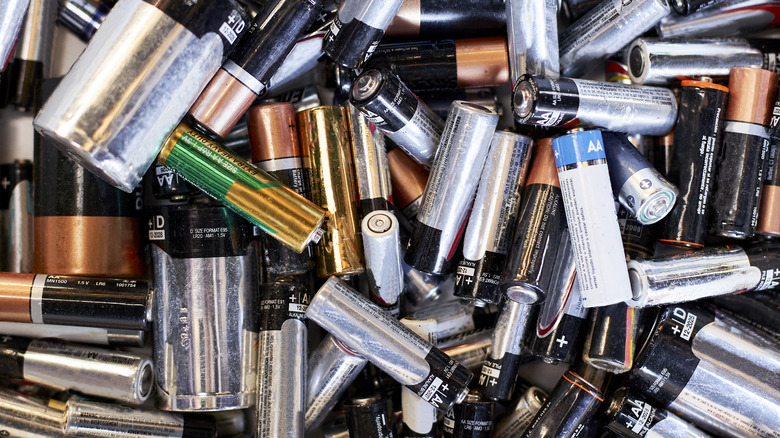Does Storing Your Batteries In The Fridge Make Them Last Longer?
As you reach into your fridge, what can you see? Right in between the milk carton and spaghetti sauce, you may come across the batteries you've kept refrigerated to stay fresh and charged for long periods of time. In our daily lives, we use this common household item to revive our TV remotes, wall clocks, flashlights, and more. Unfortunately, however, you may be subscribing to the myth that the best place to store spare batteries is in the fridge, and that just isn't true.
Battery packs come in a variety of shapes and sizes, including cylindrical, prismatic, and pouch cell batteries. While cylindrical batteries are most commonly used for our day-to-day endeavors (think AA, AAA, etc.), prismatic batteries are rectangular and enclosed in a casing. Pouch cell batteries are efficient, pouch-shaped battery packs that are relatively thinner than other batteries. Despite the varieties in which battery packs are produced, they all share one thing in common: Extreme temperatures can drain the capacity of batteries. While you may have been incorrectly storing your batteries in the fridge, we're here to help you save your batteries.
Why batteries won't survive in the fridge
Although myth followers believe that refrigerating your batteries can keep them fresh and safe from damage, it's more likely to do the opposite. Every battery has a self-discharge rate, where it loses energy even when it's not being used. Many people believe that refrigerating batteries will slow down the self-discharge rate, which is technically true, but the risks outweigh this small reward. Modern batteries have very low self-discharge rates, and the slightly longer shelf life of refrigerated batteries doesn't make up for the potential damage to them.
Low temperatures and condensation within the fridge can directly damage batteries. When batteries meet extremely low temperatures, they're more susceptible to the negative effects of humidity due to the condensation. By placing batteries in the fridge, you're actually opening them up to a damp and vaporous environment. You should also avoid pivoting to the freezer, where even colder temperatures can cause additional damage. If you've been subscribing to this myth, don't worry. You're not the only one, and it's not too late to improve your storage habits. Instead, we have a few tips on how to effectively store batteries.
Proper ways to store your batteries
Battery manufacturing companies recommend leaving batteries in their original packaging rather than transferring them to Ziploc bags or plastic containers. Batteries should be stored away from other objects — especially other metals — to avoid short-circuiting and potential leaks. The environment should be dry and at room temperature or slightly cooler, around an estimated 59 degrees Fahrenheit. The temperature shouldn't go past 85 degrees Fahrenheit, so it's best to ensure the environment where you place your batteries and other delicate household items is climate-controlled. If not, just be vigilant to the temperature of the room so that your batteries remain fresh and long-lasting.
Depending on the battery's state of charge, it may be an optimal choice to charge lead-acid and lithium-ion batteries fully or partially to maintain their energetic capacity. Battery monitors are another great option for an easy way to monitor, protect, and optimize battery performance over time. Your batteries should be in a much better place than in the fridge!



